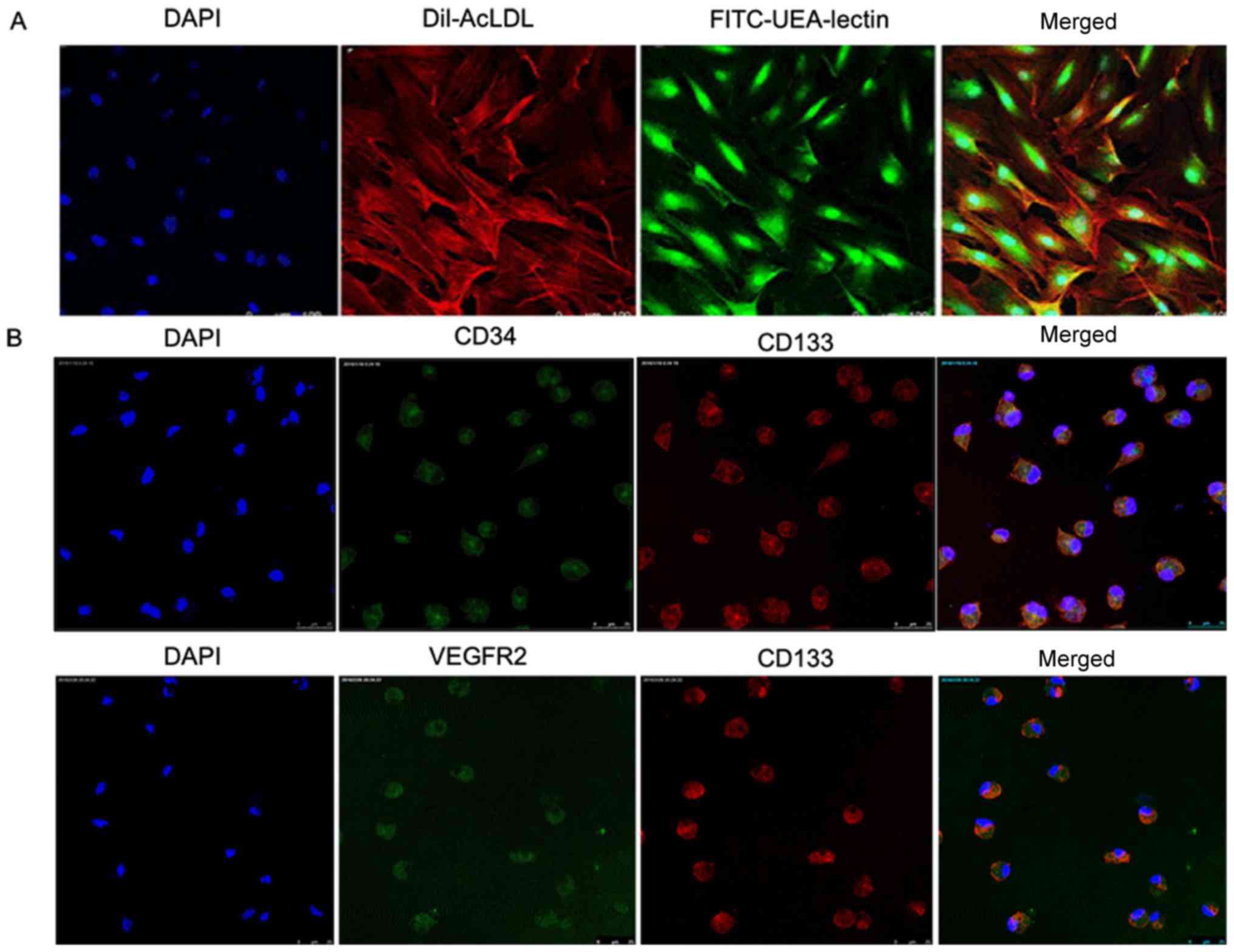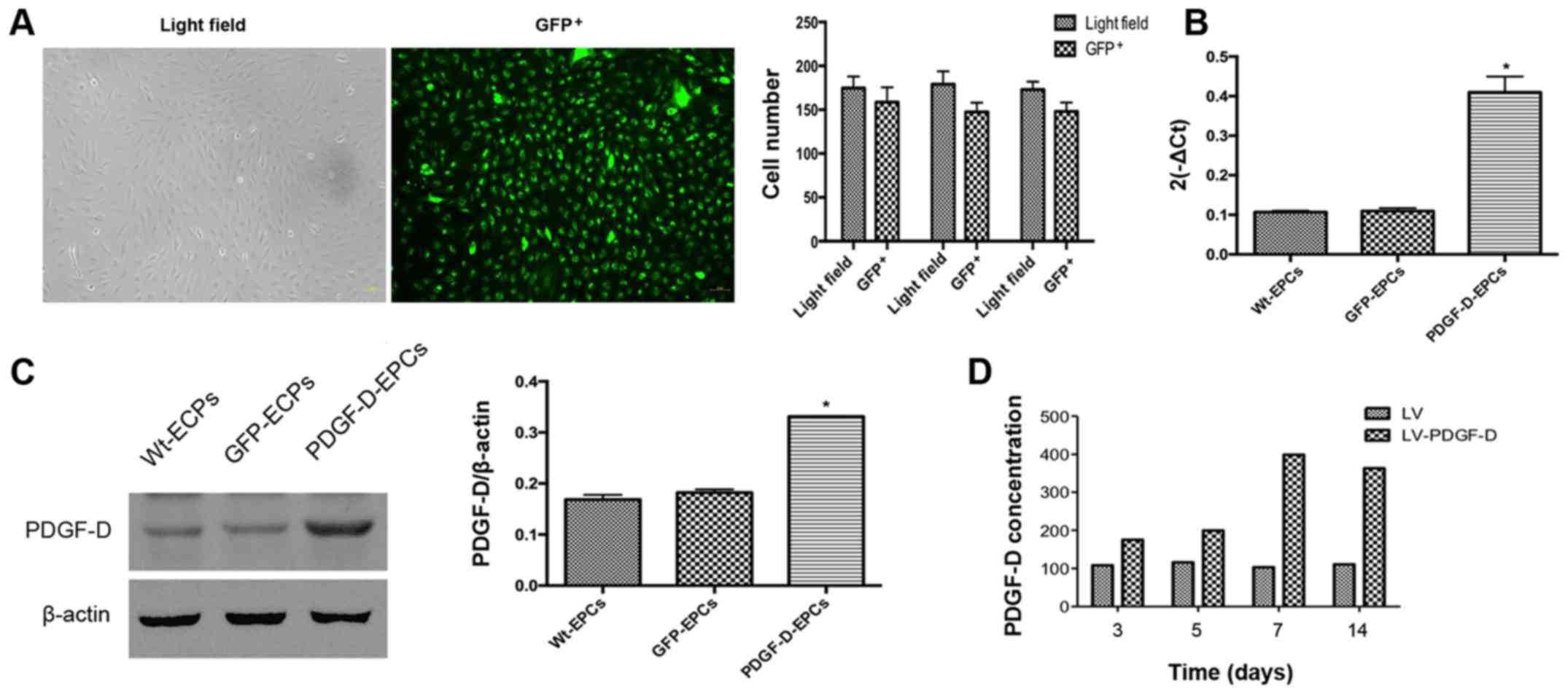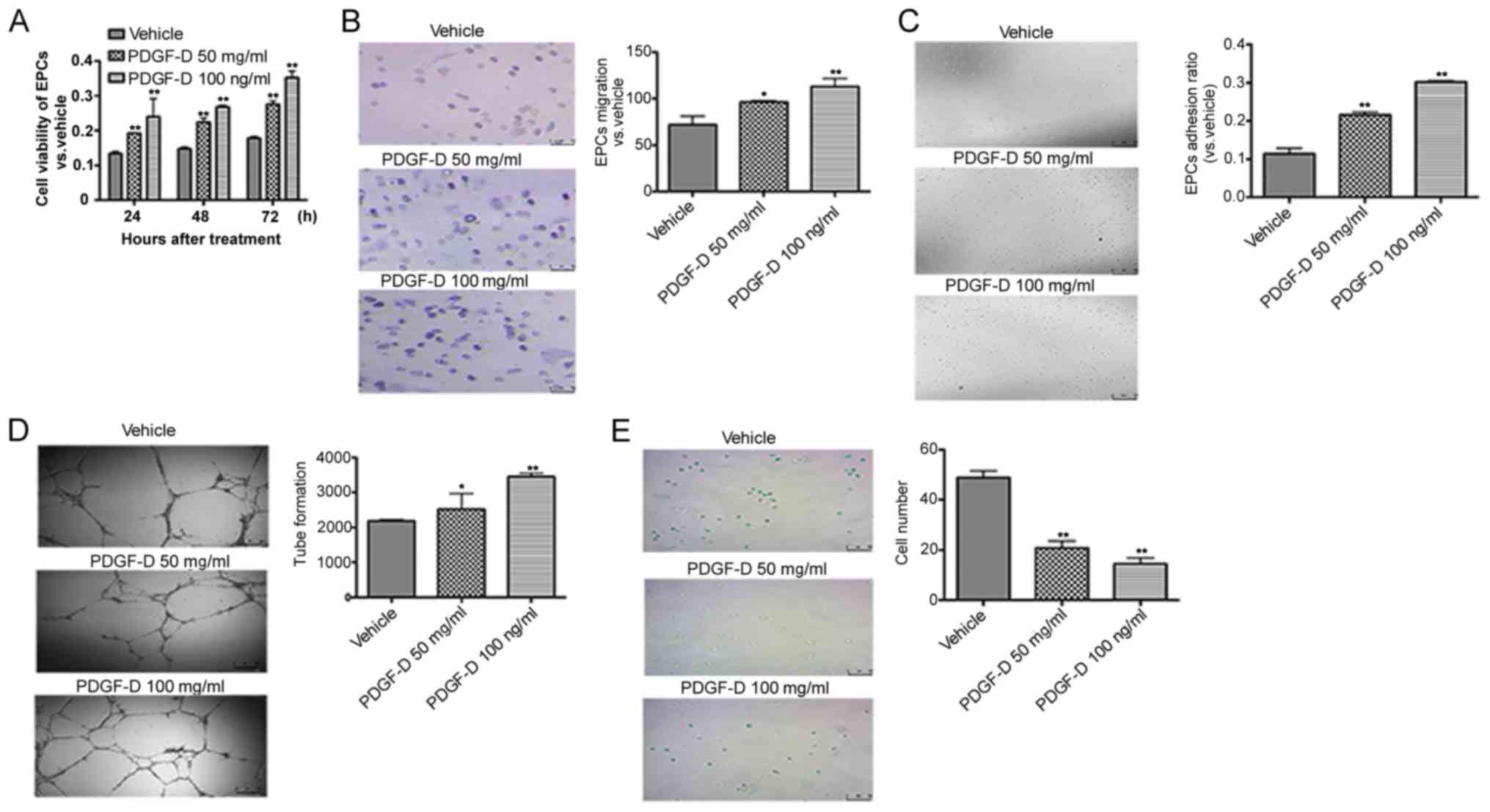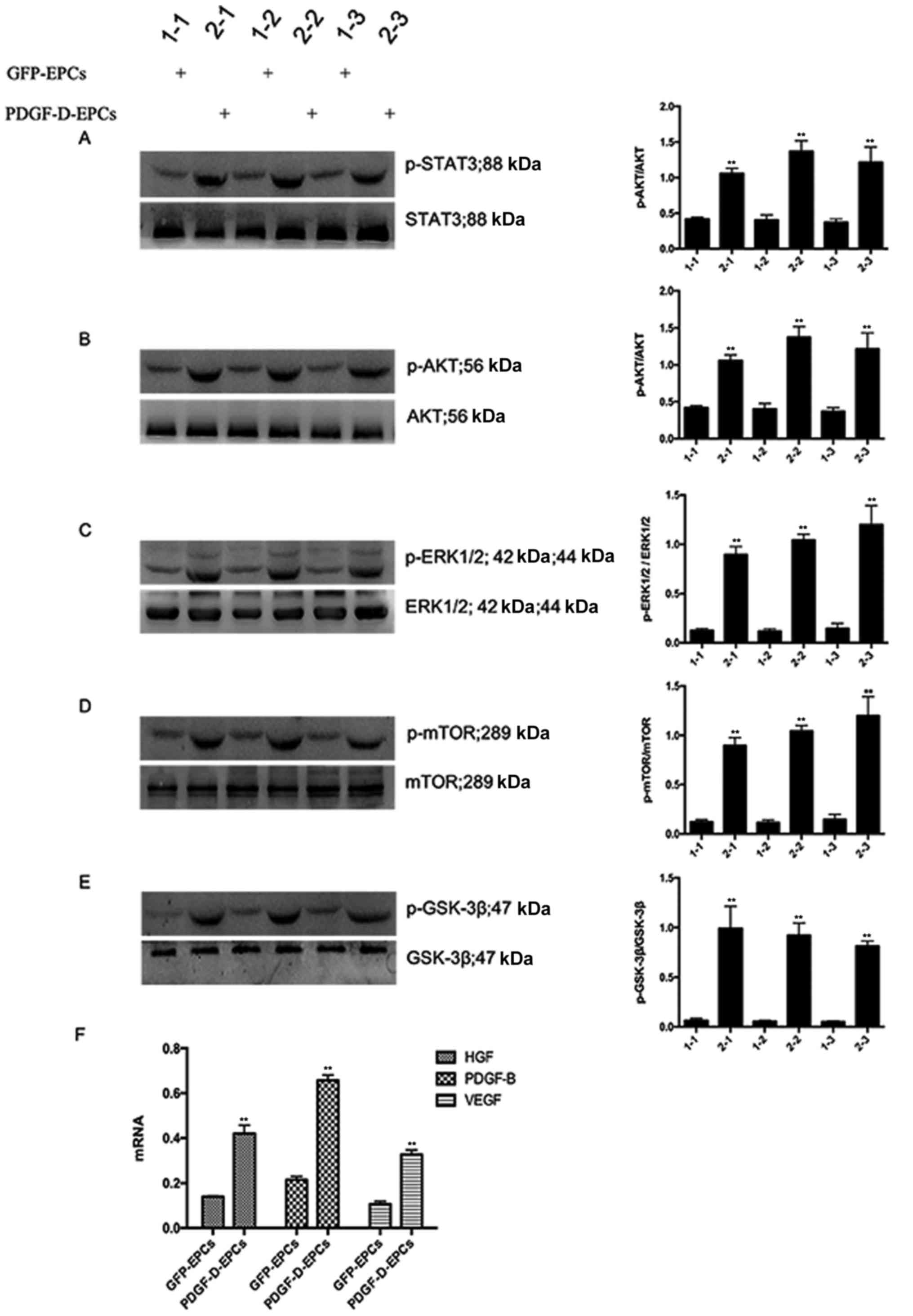|
1
|
Annex BH: Therapeutic angiogenesis for
critical limb ischaemia. Nat Rev Cardiol. 10:387–396. 2013.
View Article : Google Scholar : PubMed/NCBI
|
|
2
|
Malo-Michèle M, Bugnon C and Fellmann D:
Cytoimmunological study of the corticotrophic and
corticomelanotrophic cells in the adenohypophysis of Boops salpa L.
(marine teleost) in different experimental conditions (variation of
salinity and of background color). C R Acad Sci Hebd Seances Acad
Sci D. 283:643–646. 1976.(In French). PubMed/NCBI
|
|
3
|
Rehman J, Li J, Orschell CM and March KL:
Peripheral blood ‘endothelial progenitor cells’ are derived from
monocyte/macrophages and secrete angiogenic growth factors.
Circulation. 107:1164–1169. 2003. View Article : Google Scholar : PubMed/NCBI
|
|
4
|
Leu S, Day YJ, Sun CK and Yip HK:
tPA-MMP-9 axis plays a pivotal role in mobilization of endothelial
progenitor cells from bone marrow to circulation and ischemic
region for angiogenesis. Stem Cells Int. 2016:54175652016.
View Article : Google Scholar : PubMed/NCBI
|
|
5
|
Modarai B, Humphries J, Burnand KG,
Gossage JA, Waltham M, Wadoodi A, Kanaganayagam GS, Afuwape A,
Paleolog E and Smith A: Adenovirus-mediated VEGF gene therapy
enhances venous thrombus recanalization and resolution.
Arterioscler Thromb Vasc Biol. 28:1753–1759. 2008. View Article : Google Scholar : PubMed/NCBI
|
|
6
|
Ye Y, Li X, Zhang Y, Shen Z and Yang J:
Androgen modulates functions of endothelial progenitor cells
through activated Egr1 signaling. Stem Cells Int. 2016:1–16. 2016.
View Article : Google Scholar
|
|
7
|
Liang J, Huang W, Cai W, Wang L, Guo L,
Paul C, Yu XY and Wang Y: Inhibition of microRNA-495 enhances
therapeutic angiogenesis of human induced pluripotent stem cells.
Stem Cells. 35:337–350. 2017. View Article : Google Scholar : PubMed/NCBI
|
|
8
|
Shimamura M, Nakagami H, Koriyama H and
Morishita R: Gene therapy and cell-based therapies for therapeutic
angiogenesis in peripheral artery disease. Biomed Res Int.
2013:1862152013. View Article : Google Scholar : PubMed/NCBI
|
|
9
|
Li X and Eriksson U: Novel PDGF family
members: PDGF-C and PDGF-D. Cytokine Growth Factor Rev. 14:91–98.
2003. View Article : Google Scholar : PubMed/NCBI
|
|
10
|
Bergsten E, Uutela M, Li X, Pietras K,
Ostman A, Heldin CH, Alitalo K and Eriksson U: PDGF-D is a
specific, protease-activated ligand for the PDGF beta-receptor. Nat
Cell Biol. 3:512–516. 2001. View
Article : Google Scholar : PubMed/NCBI
|
|
11
|
Tang B, Gong JP, Sun JM, Luo WJ, Chen YK,
Liu ZJ, Li F and Fu J: Construction of a plasmid for expression of
rat platelet-derived growth factor C and its effects on
proliferation, migration and adhesion of endothelial progenitor
cells. Plasmid. 69:195–201. 2013. View Article : Google Scholar : PubMed/NCBI
|
|
12
|
Chen J, Yuan W, Wu L, Tang Q, Xia Q, Ji J,
Liu Z, Ma Z, Zhou Z, Cheng Y and Shu X: PDGF-D promotes cell
growth, aggressiveness, angiogenesis and EMT transformation of
colorectal cancer by activation of Notch1/Twist1 pathway.
Oncotarget. 8:9961–9973. 2017.PubMed/NCBI
|
|
13
|
Zhao L, Zhang C, Liao G and Long J:
RNAi-mediated inhibition of PDGF-D leads to decreased cell growth,
invasion and angiogenesis in the SGC-7901 gastric cancer xenograft
model. Cancer Biol Ther. 9:42–48. 2010. View Article : Google Scholar : PubMed/NCBI
|
|
14
|
Chen J, Han Y, Lin C, Zhen Y, Song X, Teng
S, Chen C, Chen Y, Zhang Y and Hui R: PDGF-D contributes to
neointimal hyperplasia in rat model of vessel injury. Biochem
Biophys Res Commun. 329:976–983. 2005. View Article : Google Scholar : PubMed/NCBI
|
|
15
|
Uutela M, Wirzenius M, Paavonen K,
Rajantie I, He Y, Karpanen T, Lohela M, Wiig H, Salven P, Pajusola
K, et al: PDGF-D induces macrophage recruitment, increased
interstitial pressure and blood vessel maturation during
angiogenesis. Blood. 104:3198–3204. 2004. View Article : Google Scholar : PubMed/NCBI
|
|
16
|
Livak KJ and Schmittgen TD: Analysis of
relative gene expression data using real-time quantitative PCR and
the 2ΔΔCT method. Methods. 25:402–408. 2001.
View Article : Google Scholar : PubMed/NCBI
|
|
17
|
Nie Z, Xu L, Li C, Tian T, Xie P, Chen X
and Li B: Association of endothelial progenitor cells and peptic
ulcer treatment in patients with type 2 diabetes mellitus. Exp Ther
Med. 11:1581–1586. 2016. View Article : Google Scholar : PubMed/NCBI
|
|
18
|
Yoder MC, Mead LE, Prater D, Krier TR,
Mroueh KN, Li F, Krasich R, Temm CJ, Prchal JT and Ingram DA:
Redefining endothelial progenitor cells via clonal analysis and
hematopoietic stem/progenitor cell principals. Blood.
109:1801–1809. 2007. View Article : Google Scholar : PubMed/NCBI
|
|
19
|
Sun YY, Bai WW, Wang B, Lu XT, Xing YF,
Cheng W, Liu XQ and Zhao YX: Period 2 is essential to maintain
early endothelial progenitor cell function in vitro and
angiogenesis after myocardial infarction in mice. J Cell Mol Med.
18:907–918. 2014. View Article : Google Scholar : PubMed/NCBI
|
|
20
|
Gu Y, Ampofo E, Menger MD and Laschke MW:
miR-191 suppresses angiogenesis by activation of NF-κB signaling.
FASEB J. 31:3321–3333. 2017. View Article : Google Scholar : PubMed/NCBI
|
|
21
|
van Balkom BW, de Jong OG, Smits M,
Brummelman J, den Ouden K, de Bree PM, van Eijndhoven MA, Pegtel
DM, Stoorvogel W, Würdinger T, et al: Endothelial cells require
miR-214 to secrete exosomes that suppress senescence and induce
angiogenesis in human and mouse endothelial cells. Blood.
121:3997–4006. 2013. View Article : Google Scholar : PubMed/NCBI
|
|
22
|
Lebas B, Galley J, Renaud-Gabardos E,
Pujol F, Lenfant F, Garmy-Susini B, Chaufour X and Prats AC:
Therapeutic benefits and adverse effects of combined proangiogenic
gene therapy in mouse critical leg ischemia. Ann Vasc Surg.
40:252–261. 2017. View Article : Google Scholar : PubMed/NCBI
|
|
23
|
Lee S, Park C, Han JW, Kim JY, Cho K, Kim
EJ, Kim S, Lee SJ, Oh SY, Tanaka Y, et al: Direct reprogramming of
human dermal fibroblasts into endothelial cells using ER71/ETV2.
Circ Res. 120:848–861. 2017. View Article : Google Scholar : PubMed/NCBI
|
|
24
|
Asahara T and Kawamoto A: Endothelial
progenitor cells for postnatal vasculogenesis. Am J Physiol Cell
Physiol. 287:C572–C579. 2004. View Article : Google Scholar : PubMed/NCBI
|
|
25
|
De Val S and Black BL: Transcriptional
control of endothelial cell development. Dev Cell. 16:180–195.
2009. View Article : Google Scholar : PubMed/NCBI
|
|
26
|
Velazquez OC: Angiogenesis and
vasculogenesis: inducing the growth of new blood vessels and wound
healing by stimulation of bone marrow-derived progenitor cell
mobilization and homing. J Vasc Surg. 45 Suppl A:A39–A47. 2007.
View Article : Google Scholar : PubMed/NCBI
|
|
27
|
Caiado F and Dias S: Endothelial
progenitor cells and integrins: Adhesive needs. Fibrogenesis Tissue
Repair. 5:42012. View Article : Google Scholar : PubMed/NCBI
|
|
28
|
Cao R, Bråkenhielm E, Li X, Pietras K,
Widenfalk J, Ostman A, Eriksson U and Cao Y: Angiogenesis
stimulated by PDGF-CC, a novel member in the PDGF family, involves
activation of PDGFR-alphaalpha and -alphabeta receptors. FASEB J.
16:1575–1583. 2002. View Article : Google Scholar : PubMed/NCBI
|
|
29
|
Lakatta EG and Levy D: Arterial and
cardiac aging: Major shareholders in cardiovascular disease
enterprises: Part I: Aging arteries: A ‘set up’ for vascular
disease. Circulation. 107:139–146. 2003. View Article : Google Scholar : PubMed/NCBI
|
|
30
|
Novella S, Heras M, Hermenegildo C and
Dantas AP: Effects of estrogen on vascular inflammation: A matter
of timing. Arterioscler Thromb Vasc Biol. 32:2035–2042. 2012.
View Article : Google Scholar : PubMed/NCBI
|
|
31
|
Williamson K, Stringer SE and Alexander
MY: Endothelial progenitor cells enter the aging arena. Front
Physiol. 3:302012. View Article : Google Scholar : PubMed/NCBI
|
|
32
|
Volaklis KA, Tokmakidis SP and Halle M:
Acute and chronic effects of exercise on circulating endothelial
progenitor cells in healthy and diseased patients. Clin Res
Cardiol. 102:249–257. 2013. View Article : Google Scholar : PubMed/NCBI
|
|
33
|
Ekman S, Kallin A, Engström U, Heldin CH
and Rönnstrand L: SHP-2 is involved in heterodimer specific loss of
phosphorylation of Tyr771 in the PDGF beta-receptor. Oncogene.
21:1870–1875. 2002. View Article : Google Scholar : PubMed/NCBI
|
|
34
|
Muhl L, Folestad EB, Gladh H, Wang Y,
Moessinger C, Jakobsson L and Eriksson U: Neuropilin 1 binds PDGF-D
and is a co-receptor in PDGF-D-PDGFRβ signaling. J Cell Sci.
130:1365–1378. 2017. View Article : Google Scholar : PubMed/NCBI
|
|
35
|
Yu J, Zhang Y, McIlroy J, Rordorf-Nikolic
T, Orr GA and Backer JM: Regulation of the p85/p110
phosphatidylinositol 3′-kinase: Stabilization and inhibition of the
p110alpha catalytic subunit by the p85 regulatory subunit. Mol Cell
Biol. 18:1379–1387. 1998. View Article : Google Scholar : PubMed/NCBI
|
|
36
|
Buday L, Egan SE, Rodriguez Viciana P,
Cantrell DA and Downward J: A complex of Grb2 adaptor protein, Sos
exchange factor and a 36-kDa membrane-bound tyrosine phosphoprotein
is implicated in ras activation in T cells. J Biol Chem.
269:9019–9023. 1994.PubMed/NCBI
|
|
37
|
Rao GN: Hydrogen peroxide induces complex
formation of SHC-Grb2-SOS with receptor tyrosine kinase and
activates Ras and extracellular signal-regulated protein kinases
group of mitogen-activated protein kinases. Oncogene. 13:713–719.
1996.PubMed/NCBI
|
|
38
|
Demoulin JB and Essaghir A: PDGF receptor
signaling networks in normal and cancer cells. Cytokine Growth
Factor Rev. 25:273–283. 2014. View Article : Google Scholar : PubMed/NCBI
|
|
39
|
Hasan J, Shnyder SD, Bibby M, Double JA,
Bicknel R and Jayson GC: Quantitative angiogenesis assays in vivo-a
review. Angiogenesis. 7:1–16. 2004. View Article : Google Scholar : PubMed/NCBI
|


















